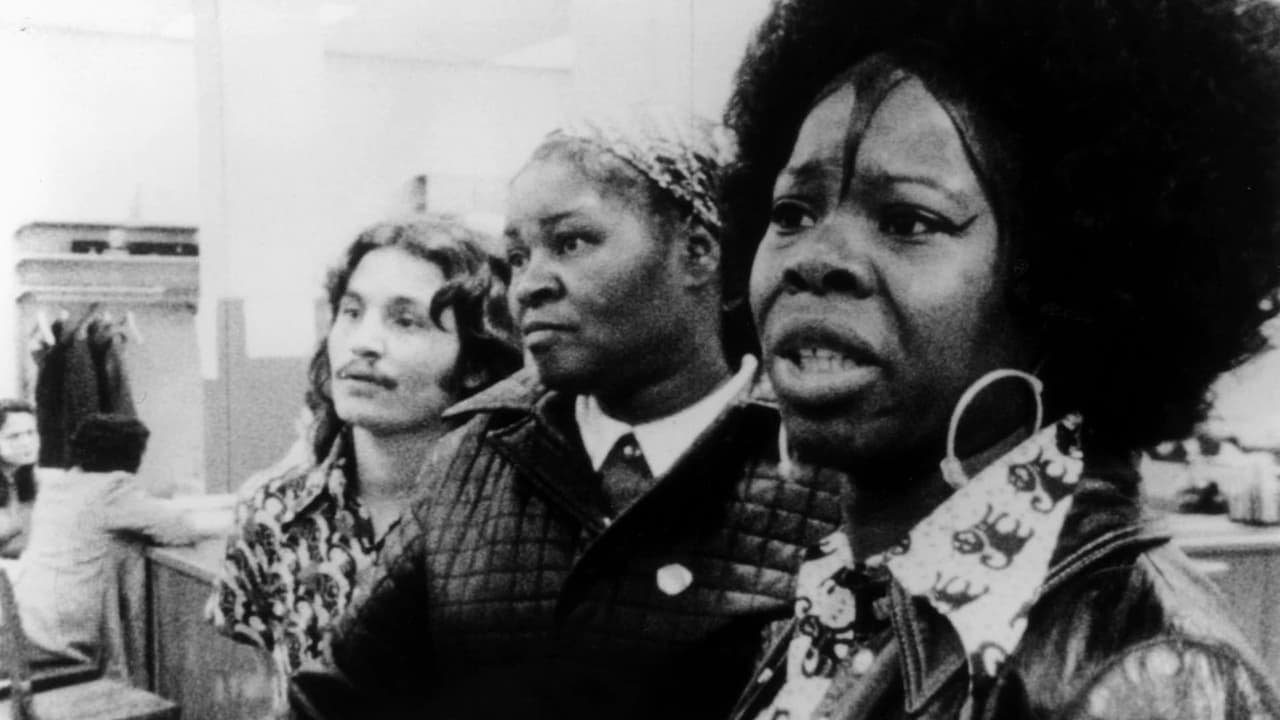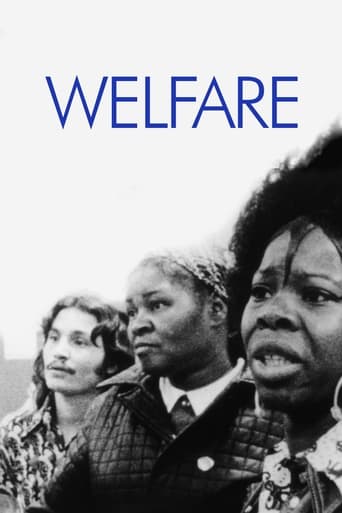

the leading man is my tpye
... View MoreThis is a tender, generous movie that likes its characters and presents them as real people, full of flaws and strengths.
... View MoreThe first must-see film of the year.
... View MoreThe best films of this genre always show a path and provide a takeaway for being a better person.
... View MoreThe documentary "Welfare 1975" was painfully touching in every way. This documentary by Fredrick Wiseman showed what it would really be like to be on welfare. The entire film of almost three hours was all about different exchanges between the people who are struggling financially in New York in 1974 and the people who worked in the welfare offices. Nothing went as planed for either party. While this documentary was pretty uneventful, it was still hypnotizing because nothing in this documentary was staged. Wisemen has been known for creating amazing, undramatized documentaries, but the simplicity and the power behind this film is undeniable. All of the things that were caught on camera were real encounters which made the whole film so much more touching. One can watch an actual person beg for help and be turned away. This documentary showed both sides to what happens in welfare situations: The people who really needed help and got turned away, the people who did not need help received support. These were the two extremes that people usually think of first when the topic of welfare is brought up. One event in this documentary really touched me. There is a man there and he says this amazing quote. "I have 22 years of education behind me and 17 years of loyalty to this state. Now, after 7 months in the hospital that is going to change." Then this tall, New York man sits down in the waiting area and he prays out loud to God saying that he will accept what is to come. In this moment, a janitor is listening to his prayer in awe. This moment really speaks for the whole documentary. This Fredrick Wiseman documentary showed the other side to a welfare situation and for that I will forever adore Wisemen. His work is well known, but one will never understand how powerful his films are until one watches them. I would rate this film at an eight out of ten stars because it was very long and some what repetitive. However, I would not take back any of the time that I spent watching this documentary because it was very real and moving. It showed how welfare is needed but policies do need to be altered to make it fool proof. Since 1975, the government has obviously made some changes to welfare, but I do believe that this film highly influenced where welfare went after that set time.
... View More"The fundamental problem of capitalism is that it is structured, in its very operation, to make it impossible for millions, even billions, to be free in any meaningful sense." - Geoff Mann Capitalism cannot provide full employment. Some economists believe an 8 to 10 percent national unemployment rate is "ideal", as anything lower leads to recessions and aggressive inflation. Beyond this, it is in the upper and middle classes best interest to have a segment of the labour force perpetually out of work. For the upper classes, this leads to lower wages having to be paid, the ability to use the threat of unemployment to keep workers in line, and an excess pool of skilled labourers to choose from. For the middle and lower classes, unemployment offers some stability to their dollar and keeps the prices of goods within their reach. Because capitalism cannot provide full employment – Reagan and Thatcher, the chieftains of neoliberal capitalism, would boast that unemployment was "necessary for an economy" – radical groups typically demand full employment, using such ancillary demands as a means of destabilising or dethroning the status quo.Given that capitalism cannot provide full employment, and that there are always more people than available jobs, it seems strange that many aggressively demonize the unemployed, especially when, in some dubious ways, unemployment is "in everyone else's best interest". As an old economics joke goes: don't be angry at the unemployed, be thankful that they didn't take your job.Even more bizarre is the constant slandering of government welfare. Historically, welfare has always been the price capitalists pay to avoid revolution. Giving money to 8 or so percent of your population placates them, keeps them from getting agitated and militant. Welfare thus has a complex political purpose within modern society. These policies appeal to the masses, plaster over the inefficiencies of laissez-faire capitalism, and also help create divisions within the working class ("look at those lazy parasites!"). Ironically, the middle class has its own respectable social programs, in the form of social security, pensions, unemployment insurance, health care and so on, but the hypocrisy here is rarely grasped. And of course no sector of society is more dependent on "the nanny state" than transnational corporations, which manipulate governments/taxpayers into absorbing the unprofitable parts of the production process and which require states to guarantee markets.More than this, welfare is used as a tool to keep alternatives to capitalism at bay. When the American communist party was formed in 1919, it and other leftist groups were like a thorn in capitalism's side. When the New Deal came in the 1930s, it was, though bashed by the petite-bourgeoisie, supported by huge banks, corporations, and financial and insurance companies (Chase National Bank, Procter and Gamble, Grace National Bank, Leeds and Northrup, Goldman Sachs etc). Better to give the poor some handouts than watch them start asking questions. Historian Barton J. Bernstein would say "The liberal reforms of the New Deal did not transform the American system; they conserved and protected American corporate capitalism, occasionally by absorbing parts of threatening programs." Historian William E. Leuchtenburg would say similar reforms served but to "contain and placate radical labour groups".Today, welfare programs are being aggressively shut down or scaled back. They are, many argue, unsustainable and "responsible for debt". Some are outright called "Ponzi schemes", everyone ignoring the fact that capitalism itself is a Ponzi-like scheme that is inherently unsustainable and must exponentially increase aggregate debt; any system which runs on interest-issued currency will always owe more cash than there is cash available, thereby necessitating poverty and massive inequality.Frederick Wiseman's "Welfare" is one of the director's best films. At two and a half hours long, this is a mammoth documentary set entirely within the windowless walls of an urban welfare office. Here, a steady stream of unemployed men and women plead their cases before social workers.What's immediately apparently is the difference in body language between the employed and unemployed. Wiseman's unemployed faces are forlorn, petrified, on edge, most seemingly lost in depression. Some are on drugs, some seem to have sexual-identity "issues", some are well educated, some are white, some black, some seem to be recent immigrants. "Well get a job!" a government worker yells when an unemployed man shows his empty pockets. Here, class bigotry reveals its ugly face. The victim politely says thank you and walks away.As is typical of Wiseman, the film opens and closes with symbolic vignettes. Wiseman opens with a native American who talks about land being stolen, the implication perhaps being that the bureaucratic juggernaut he now faces represents a system foisted upon men and women. Participation is not a choice. Wiseman then closes on an educated man who gives an extensive rant about poverty, inequality and waste. The guy, whose tortured genuflections recall Wiseman's "Titicut Follies", possibly has mental issues. But which came first, the madness or the madhouse?8.5/10 – See Wiseman's "Belfast, Maine".
... View More"Welfare" is the fourth Frederick Wiseman documentary I've seen and they have all been outstanding. The others I've watched, "Primate", "Law and Order", and "Titticut Follies" I would rank slightly above "Welfare" for the simple reason that they are harder hitting films. "Welfare" is very long and totally mesmerizing but it's all about the process of waiting and people drifting endlessly through the system. It's all conversations between welfare caseworkers and people who are trying to get their checks. As usual, Wiseman finds some of most astonishing footage imaginable. Some of the stuff its hard to fathom how he managed to film it. You wonder if the people knew they were being filmed, and if so, did they care? They don't seem to. It was shot in 1974, and presumably on film, so the cameras would have been noticeable. The thing I love about Wiseman is that he doesn't stand in judgement. He just shows. And when you expect his camera to pull away it doesn't. And then something even more astonishing happens. Admittedly, in "Welfare" the astonishment is on a more subtle level than in some of his other films. There are no moments that make your jaw drop in horror at the human condition like in Wiseman's "Law and Order" when two cops chokehold a cowering prostitute into oblivion or the nightmarish talent show in "Titticut Follies". The moments that stand out in "Welfare" are the smaller ones. The way one couple's story about how badly they need their welfare check slowly dissolves as they get caught in one lie after another. The hippie girl who complains about her apartment being declared an unfit home for her infant just because her boyfriend's "diseased" dog also lives there. The way one caseworker (who seems like a wimp at first) is able to firmly (and justly) stick up for one of his cases. But the real treat of seeing a Frederick Wiseman documentary cannot fully be described in words. I think he is the greatest documentary filmmaker in history. His films are truly like social x-rays. Every one of his films I've seen is far and away better than any other documentary I've seen by any other filmmaker.
... View MoreNow THIS is the best documentary ever made. in these times where ranking has become an obsession, I implore all of you out there to demand to see this film. Like Beckett this movie is funny,dark,clever and insightful. The "Happy Couple" goes down in documentary history as one of the greatest catches!
... View More